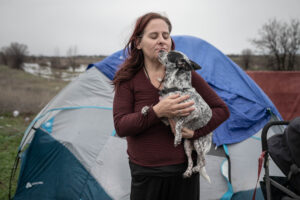by Leslie Layton
posted Aug. 7
The legal aid agency representing plaintiffs in the Warren v. Chico lawsuit has indicated it will re-negotiate the Settlement Agreement that dictates how the City must approach homelessness.

But Legal Services of Northern California (LSNC) does not seem ready to give up one requirement: That the City show there are shelter beds available prior to evicting the unhoused from public spaces.
The City Council has discussed re-negotiations in closed sessions that were held July 9 and 16 and Aug. 6, releasing information when and as it chooses. The LSNC response letter was released today by dissenting Councilmember Addison Winslow, who noted that it’s a public document that may soon be released by the City.
The City began trying to extricate itself from the Settlement Agreement following the June 28 U.S. Supreme Court ruling in Grants Pass v. Johnson. In that ruling, the Court overturned a case that was the foundation for Warren v. Chico.
Attorney John Lam said last month the City was proposing “a new agreement that would supersede the Warren Settlement Agreement …”
LSNC, representing the unhoused plaintiffs, indicates in the letter it’s willing to streamline the eviction process. But when the City enforces anti-camping ordinances, it wants unhoused people assessed and referred to appropriate shelters or a campground, with 72 hours notice.
The legal aid agency says it’s willing to give up some steps that are required under the present Settlement Agreement to give the City “the discretion it says it needs to protect the public’s health, safety, and peaceful enjoyment.” Those steps can take, at present, up to two weeks.
LSNC said its proposal still “maintains some of the best practices … to assist unhoused community members with moving indoors and ultimately into permanent housing …”
It says that plaintiffs “are glad to know that the City is committed to keeping the Pallet Shelter open through the settlement period.” It warns that “if needed” it can “continue to litigate this case” or turn to the dispute resolution process.
The City, though, has said that under a new agreement, enforcement of anti-camping ordinances and regulations should be consistent with the recent Grants Pass decision and local, state and federal laws. That seems to suggest the City wants the freedom to evict the unhoused regardless of whether they’ve been referred to available and appropriate sheltering alternatives.
Winslow said he objected both to the City’s direction and its use of closed sessions.

“The Settlement Agreement takes a ‘multifaceted’ approach, not just scattering people to the wind, but the City Council is perfectly willing to walk away from all that as if we’ve learned absolutely nothing,” Winslow said.
(Supreme Court Justice Neil Gorsuch described a “multifaceted” approach used by Grants Pass, Ore., in his ruling.)
“Every discussion has been in private,” Winslow added. “It’s unethical and undemocratic.”
On Aug. 5 he issued a press release calling for the “declassification” of various documents, including the Dispute Resolution Agreement. The City withdrew from the dispute agreement negotiation process after the U.S. Supreme Court ruling in June. The press release also said, “Protecting the City from the court of public opinion is not within the intention of open meeting exceptions in the Brown Act.”
The San Rafael-based First Amendment Coalition’s legal director, David Loy, said the Chico City Council may not be in violation of open-meeting laws. “Generally speaking, they’re not required to conduct negotiations in public,” he said. “In concept, it doesn’t sound like that’s a violation of the letter of the [Brown] Act because negotiations are ongoing.”
The Council would be required to “publicly report” after the closed session if it were to accept a “settlement offer signed by the opposing party,” the Brown Act provision reads.
In a startling move earlier this week, the City began a major clean-up of its Alternate Site campground for unhoused people at Eaton and Cohasset roads. Although campers had been noticed, no press release had been issued in advance as is typical with eviction sweeps.
Some people were evicted without a referral because they hadn’t been sent to the Alternate Site through the assessment process. Others were given motel rooms to occupy during the clean-up and re-organization that’s underway.
Leslie Layton is editor of ChicoSol.

Vote them out!
Right on!
I agree completely with Mary Kay and Patricia!